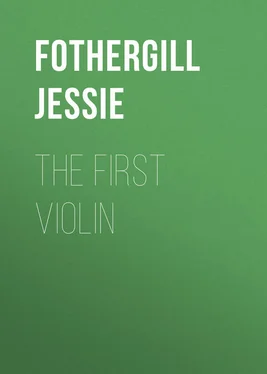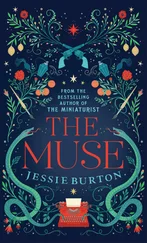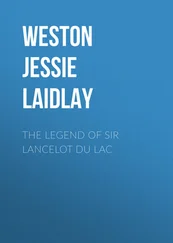Jessie Fothergill - The First Violin
Здесь есть возможность читать онлайн «Jessie Fothergill - The First Violin» — ознакомительный отрывок электронной книги совершенно бесплатно, а после прочтения отрывка купить полную версию. В некоторых случаях можно слушать аудио, скачать через торрент в формате fb2 и присутствует краткое содержание. Жанр: foreign_antique, foreign_prose, foreign_sf, на английском языке. Описание произведения, (предисловие) а так же отзывы посетителей доступны на портале библиотеки ЛибКат.
- Название:The First Violin
- Автор:
- Жанр:
- Год:неизвестен
- ISBN:нет данных
- Рейтинг книги:4 / 5. Голосов: 1
-
Избранное:Добавить в избранное
- Отзывы:
-
Ваша оценка:
- 80
- 1
- 2
- 3
- 4
- 5
The First Violin: краткое содержание, описание и аннотация
Предлагаем к чтению аннотацию, описание, краткое содержание или предисловие (зависит от того, что написал сам автор книги «The First Violin»). Если вы не нашли необходимую информацию о книге — напишите в комментариях, мы постараемся отыскать её.
The First Violin — читать онлайн ознакомительный отрывок
Ниже представлен текст книги, разбитый по страницам. Система сохранения места последней прочитанной страницы, позволяет с удобством читать онлайн бесплатно книгу «The First Violin», без необходимости каждый раз заново искать на чём Вы остановились. Поставьте закладку, и сможете в любой момент перейти на страницу, на которой закончили чтение.
Интервал:
Закладка:
“I am afraid I am taking up your time. Perhaps you had some business which you were going to when you met me.”
“My business, when I met you, was to catch the train to Elberthal, which was already gone, as you know. I shall not be able to fulfill my engagements for to-night, so it really does not matter. I am enjoying myself very much.”
“I am very glad I did meet you,” said I, growing more reassured as I found that my companion, though exceedingly polite and attentive to me, did not ask a question as to my business, my traveling companions, my intended stay or object in Elberthal – that he behaved as a perfect gentleman – one who is a gentleman throughout, in thought as well as in deed. He did not even ask me how it was that my friends had not waited a little for me, though he must have wondered why two people left a young girl, moneyless and ignorant, to find her way after them as well as she could. He took me as he found me, and treated me as if I had been the most distinguished and important of persons. But at my last remark he said, with the same odd smile which took me by surprise every time I saw it:
“The pleasure is certainly not all on your side, mein Fräulein . I suppose from that you have decided that I am to be trusted?”
I stammered out something to the effect that “I should be very ungrateful were I not satisfied with – with such a – ” I stopped, looking at him in some confusion. I saw a sudden look flash into his eyes and over his face. It was gone again in a moment – so fleeting that I had scarce time to mark it, but it opened up a crowd of strange new impressions to me, and while I could no more have said what it was like the moment it was gone, yet it left two desires almost equally strong in me – I wished in one and the same moment that I had for my own peace of mind never seen him – and that I might never lose sight of him again: to fly from that look, to remain and encounter it. The tell-tale mirror in the corner caught my eye. At home they used sometimes to call me, partly in mockery, partly in earnest, “Bonny May.” The sobriquet had hitherto been a mere shadow, a meaningless thing, to me. I liked to hear it, but had never paused to consider whether it were appropriate or not. In my brief intercourse with my venerable suitor, Sir Peter, I had come a little nearer to being actively aware that I was good-looking, only to anathematize the fact. Now, catching sight of my reflection in the mirror, I wondered eagerly whether I really were fair, and wished I had some higher authority to think so than the casual jokes of my sisters. It did not add to my presence of mind to find that my involuntary glance to the mirror had been intercepted – perhaps even my motive guessed at – he appeared to have a frightfully keen instinct.
“Have you seen the Dom?” was all he said; but it seemed somehow to give a point to what had passed.
“The Dom – what is the Dom?”
“The Kölner Dom ; the cathedral.”
“Oh, no! Oh, should we have time to see it?” I exclaimed. “How I should like it!”
“Certainly. It is close at hand. Suppose we go now.”
Gladly I rose, as he did. One of my most ardent desires was about to be fulfilled – not so properly and correctly as might have been desired, but – yes, certainly more pleasantly than under the escort of Miss Hallam, grumbling at every groschen she had to unearth in payment.
Before we could leave our seclusion there came up to us a young man who had looked at us through the door and paused. I had seen him; had seen how he said something to a companion, and how the companion shook his head dissentingly. The first speaker came up to us, eyed me with a look of curiosity, and turning to my protector with a benevolent smile, said:
“Eugen Courvoisier! Also hatte ich doch Recht! ”
I caught the name. The rest was of course lost upon me. Eugen Courvoisier? I liked it, as I liked him, and in my young enthusiasm decided that it was a very good name. The new-corner, who seemed as if much pleased with some discovery, and entertained at the same time, addressed some questions to Courvoisier, who answered him tranquilly but in a tone of voice which was very freezing; and then the other, with a few words and an unbelieving kind of laugh, said something about a schöne Geschichte , and, with another look at me, went out of the coffee-room again.
We went out of the hotel, up the street to the cathedral. It was the first cathedral I had ever been in. The shock and the wonder of its grandeur took my breath away. When I had found courage to look round, and up at those awful vaults the roofs, I could not help crying a little. The vastness, coolness, stillness, and splendor crushed me – the great solemn rays of sunlight coming in slanting glory through the windows – the huge height – the impression it gave of greatness, and of a religious devotion to which we shall never again attain; of pure, noble hearts, and patient, skillful hands, toiling, but in a spirit that made the toil a holy prayer – carrying out the builder’s thought – great thought greatly executed – all was too much for me, the more so in that while I felt it all I could not analyze it. It was a dim, indefinite wonder. I tried stealthily and in shame to conceal my tears, looking surreptitiously at him in fear lest he should be laughing at me again. But he was not. He held his cap in his hand – was looking with those strange, brilliant eyes fixedly toward the high altar, and there was some expression upon his face which I could not analyze – not the expression of a person for whom such a scene has grown or can grow common by custom – not the expression of a sight-seer who feels that he must admire; not my own first astonishment. At least he felt it – the whole grand scene, and I instinctively and instantly felt more at home with him than I had done before.
“Oh!” said I, at last, “if one could stay here forever, what would one grow to?”
He smiled a little.
“You find it beautiful?”
“It is the first I have seen. It is much more than beautiful.”
“The first you have seen? Ah, well, I might have guessed that.”
“Why? Do I look so countrified?” I inquired, with real interest, as I let him lead me to a little side bench, and place himself beside me. I asked in all good faith. About him there seemed such a cosmopolitan ease, that I felt sure he could tell me correctly how I struck other people – if he would.
“Countrified – what is that?”
“Oh, we say it when people are like me – have never seen anything but their own little village, and never had any adventures, and – ”
“Get lost at railway stations, und so weiter . I don’t know enough of the meaning of ‘countrified’ to be able to say if you are so, but it is easy to see that you – have not had much contention with the powers that be.”
“Oh, I shall not be stupid long,” said I, comfortably. “I am not going back home again.”
“So!” He did not ask more, but I saw that he listened, and proceeded communicatively:
“Never. I have – not quarreled with them exactly, but had a disagreement, because – because – ”
“Because?”
“They wanted me to – I mean, an old gentleman – no, I mean – ”
“An old gentleman wanted you to marry him, and you would not,” said he, with an odd twinkle in his eyes.
“Why, how can you know?”
“I think, because you told me. But I will forget it if you wish.”
“Oh, no! It is quite true. Perhaps I ought to have married him.”
“Ought!” He looked startled.
“Yes. Adelaide – my eldest sister – said so. But it was no use. I was very unhappy, and Miss Hallam, who is Sir Peter’s deadly enemy – he is the old gentleman, you know – was very kind to me. She invited me to come with her to Germany, and promised to let me have singing lessons.”
Читать дальшеИнтервал:
Закладка:
Похожие книги на «The First Violin»
Представляем Вашему вниманию похожие книги на «The First Violin» списком для выбора. Мы отобрали схожую по названию и смыслу литературу в надежде предоставить читателям больше вариантов отыскать новые, интересные, ещё непрочитанные произведения.
Обсуждение, отзывы о книге «The First Violin» и просто собственные мнения читателей. Оставьте ваши комментарии, напишите, что Вы думаете о произведении, его смысле или главных героях. Укажите что конкретно понравилось, а что нет, и почему Вы так считаете.












